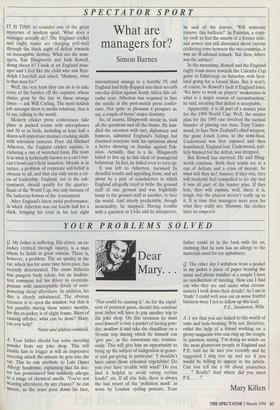SPECTATOR SPORT
What are managers for?
Simon Barnes
IT IS TIME to consider one of the great mysteries of modern sport. What does a manager actually do? The England cricket and rugby teams are charging pell-mell through the black night of defeat towards an inescapable destiny. What are the man- agers, Ray Illingworth and Jack Rowell, doing about it? I look at an England man- ager and I feel like the child who saw Ran- dolph Churchill and asked, 'Mummy, what is that man for?'
Well, the very least they can do is to take some of the burden off the captains, whose duties grow by the day in these strange times — ask Will Carling. The most ticklish job amongst them is media relations, that is to say, talking to the world.
Modem cricket press conferences take place in packed rooms with microphones and 50 or so bods, including at least half a dozen self-important maniacs cracking skulls with television cameras. Poor old Michael Atherton, the England cricket captain, is enduring a run of wretched form. His team is in what is technically known as a can't-bat- can't-bowl-can't-field situation. Morale is in tatters, a problem of corporate self-belief is obvious to all, and that can only mean a cri- sis of leadership. England, out in the sub- continent, should qualify for the quarter- finals of the World Cup, but only because of the ludicrous format of the tournament.
After England's latest awful performance, in which Atherton was out fourth ball for a duck, bringing his total in his last eight international innings to a horrific 59, and England had belly-flopped into their seventh one-day defeat against South Africa this cal- endar year, Atherton was required to face the media at the post-match press confer- ence. Not quite as pleasant a prospect as, say, a couple of hours' major dentistry.
So, of course, Illingworth strode in, took all the questions and all the blame. He han- dled the occasion with tact, diplomacy and humour, admitted England's failings but charmed everyone with his optimism about a better showing on Sunday against Pak- istan. Actually, that is a lie. Illingworth failed to live up to this ideal of managerial behaviour. In fact, he failed even to turn up.
It was left to Atherton, harassed by dreadful results and appalling form, and set about by a pair of scandalettes in which England allegedly tried to bribe the ground staff of one ground and was frightfully bossy to the ground staff at another, to face the world. And utterly predictably, though inexcusably, he snapped. Having trouble with a question in Urdu and its interpreter, he said of the journo, 'Will someone remove this buffoon?' In Pakistan, a coun- try swift to feel the smarts of a former colo- nial power and still distressed about various cricketing rows between the two countries, it was an ill-advised remark. But then, where was the adviser?
In the meantime, Rowell and the England rugby team move towards the Calcutta Cup game in Edinburgh on Saturday, with Scot- land going for a Grand Slam. But it won't, of course, be Rowell's fault if England loses. `We have to work on players' weaknesses in what is a major season of reconstruction,' he said, meaning that defeat is acceptable.
Apparently, it is all part of a master plan for the 1999 World Cup. Well, the master plan for the 1995 one involved the tactical blunder of placing one man, Tony Under- wood, to face New Zealand's chief weapon, the giant Jonah Lomu, in the semi-final. Underwood was first exposed and then humiliated. England lost; Underwood, pub- licly blamed for the defeat, was dropped.
But Rowell has survived. He and Mktg- worth continue. Both their teams are in a run of defeats and a crisis of morale. So what will they do? Answer: if they win, they will modestly feel compelled to let slip that it was all part of the master plan. If they lose, they will explain, well, there it is, tough, but the players weren't really up to it. It is time that managers were seen for what they really are. Mummy, the clothes have no emperor.


































































 Previous page
Previous page